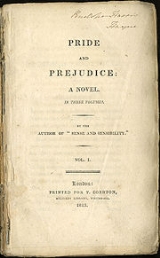
by Jane Austen
, first published in 1813. The story follows the main character Elizabeth Bennet
as she deals with issues of manners, upbringing, morality, education and marriage in the society of the landed gentry
of early 19th-century England. Elizabeth is the second of five daughters of a country gentleman, living near the fictional town of Meryton in Hertfordshire
, near London
.
Though the story is set at the turn of the 19th century, it retains a fascination for modern readers, continuing near the top of lists of 'most loved books' such as The Big Read.
It is a truth universally acknowledged, that a single man in possession of a good fortune, must be in want of a wife. However little known the feelings or views of such a man may be on his first entering a neighbourhood, this truth is so well fixed in the minds of the surrounding families, that he is considered the rightful property of some one or other of their daughters. (Ch. 1)
![]()
She [Mrs. Bennet] was a woman of mean understanding, little information, and uncertain temper. (Ch. 1)
![]()
"She is tolerable; but not handsome enough to tempt me; I am in no humour at present to give consequence to young ladies who are slighted by other men. You had better return to your partner and enjoy her smiles, for you are wasting your time with me." (Mr Darcy to Mr. Bingley about Elizabeth Bennet; Ch. 3)
![]()
"But I can assure you," she added, "that Lizzy does not lose much by not suiting his fancy; for he is a most disagreeable, horrid man, not at all worth pleasing. So high and so conceited that there was no enduring him! He walked here, and he walked there, fancying himself so very great! Not handsome enough to dance with! I wish you had been there, my dear, to have given him one of your set-downs. I quite detest the man." (Mrs. Bennet to Mr. Bennet about Mr. Darcy; Ch. 3)
![]()
"I could easily forgive his pride, if he had not mortified mine." (Elizabeth about Darcy; Ch. 5)
![]()
"Vanity and pride are different things, though the words are often used synonymously. A person may be proud without being vain. Pride relates more to our opinion of ourselves, vanity to what we would have others think of us." (Mary; Ch. 5)
![]()
If a woman is partial to a man, and does not endeavour to conceal it, he must find it out. (Ch. 6)
![]()

